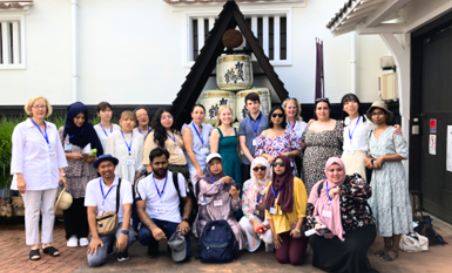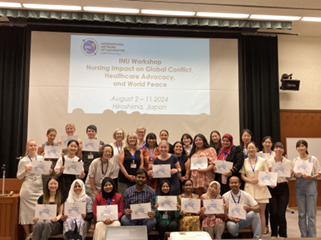INU Nursing Workshop
The program was held in Hiroshima City in conjunction with Hiroshima Peace Memorial Day (August 6, the day of the atomic bombing of Hiroshima). Inclusion to attending the peace events in the Peace Memorial Ceremony, workshop participants had opportunities to have lectures by A-bomb survivors, and visits to Hiroshima Peace Memorial Museum. Further, participants learn about nursing in accordance with the themes through preliminary study materials, field studies, lectures by health professionals, and group work discussions. Past themes included "Disaster Nursing," "Medical Safety and Quality of Care," and "Nursing in Conflict" to promote participants learning as healthcare professionals.
The participating universities are from six INU member countries: the United States, Sweden, Spain, the United Kingdom, the Republic of South Africa, and Japan, and both faculty and students will participate.
The 5th INU Nursing Workshop (2024)
The nine-day workshop, August 2-10, 2024, was held under the theme "Workshop Nursing Impact on Global Conflict, Healthcare Advocacy and World Peace. The theme of the workshop was "Nursing Impact on Global Conflict, Healthcare Advocacy and World Peace. A total of 26 students from four INU member universities participated in the workshop. All lectures and discussions were conducted in English, and on the final day, three groups presented their learning on the themes of "Conflict," "Healthcare" and "World Peace.

Day 1: Orientation, SAKE brewery tour, welcome party for the whole INU
The INU welcome party was held at the Higashi-Hiroshima Campus, so we visited a sake brewery in Higashi-Hiroshima City to learn about traditional Japanese sake brewing and stroll around the town with its red brick chimneys and white walls.

Day 2: Student presentations and lectures on medical systems in each country, Japanese food experience (Okonomiyaki)
Students gave presentations on healthcare systems in various countries based on their prior research. In addition to the three countries participating from overseas, presentations were given on 10 countries, including Japan and the countries of origin of the international students.

Day 3: Lecture, group work, home hospice visit
We attended a lecture on topics such as conflict, conflict-induced migration, and the role of healthcare workers in conflict situations, followed by group work. We visited a home hospice in a typical Japanese house.

Day 4: Hibakusha (a bomb survivor) talk, tour of Peace Memorial Museum, lecture, group work
We listened to testimonies from atomic bomb survivors and visited the Peace Memorial Museum. In the afternoon, we visited the UNITAR Hiroshima Office to learn about the activities of UN agencies in conflict zones and participated in group work.

Day 5: Attend Peace Memorial Ceremony, sightseeing in Miyajima, lantern floating ceremony
Attended the 79th Peace Memorial Ceremony, spent the day reflecting on the testimonies of atomic bomb survivors from the previous day and visiting the museum. In the afternoon, visited Miyajima, and in the evening, experienced the lantern floating ceremony.

Day 6: Lecture, group work, Japanese cultural experience (Kagura)
We learned about the activities of a doctor who has been treating atomic bomb survivors for many years and the family of a nurse who worked during the atomic bombing. In the evening, thanks to the kindness of members of the kendo club, we observed and tried kendo, and watched Hiroshima kagura, experiencing Japanese culture.

Day 7: Group work, sightseeing at Kintai Bridge (Traditionally built wooden bridge)
Based on what we learned so far, we did some group work. In the afternoon, we went sightseeing at Kintaikyo Bridge, Iwakuni Castle, and the castle town.

Day 8: Group work, lecture, hospital tour (emergency department and system at hospital), Japanese cultural experience (Tea Ceremony)
We attended a lecture on the roles and activities of medical professionals during disasters. We also continued our group work. In the evening, we learned about Japanese culture through tea ceremony and kimono dressing experiences.

Day 9: Final group presentations, completion ceremony
Each group gave their final presentations. Everyone made it to the last day and participated in the graduation ceremony.
From the beginning of the program, students supported each other and actively worked as a team to tackle with the theme of "Nursing in Conflict". It was not only the memory of the atomic bombing 80 years ago, but also about to reflect and think about the contemporary conflicts, while praying for world peace. Based on group presentations at UNITAR and lectures by experts on postwar and post-disaster medicine, the final day's presentations were followed by lively discussions. Through this workshop, the students explored nursing again from an international perspective and learned what could be our expectations to act as professionals in times of conflict and disaster. They were also stimulated by the positive attitude of the overseas students and spent a fulfilling nine days.


 Home
Home